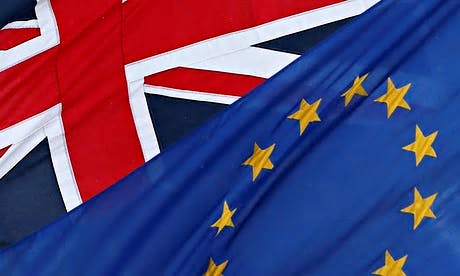Brexit Update - 04/02/2020
The
UK has now left the EU.
To
find out more information please click on the links below.
For
information regarding trade agreements: https://www.gov.uk/search/all?keywords=trade+agreements&order=relevance
For
more information regarding the transition period: https://www.gov.uk/transition
A wider range of information regarding Brexit
and what it means for your business (download your Brexit checklist): https://www.britishchambers.org.uk/page/brexit-hub
What changes will businesses face from 31st January 2020?
The Withdrawal Agreement provides for business-as-usual trading arrangements between the UK and the EU during the transition period until the end of 2020. Businesses should not experience rule changes, require new licences, or face new trade frictions in this time. However, much could change thereafter and businesses will need information in a timely fashion and help so they can make the necessary preparations.
Business know that UK-EU market access arrangements will change and the details will be set out in the new trade agreement.
At the moment, all businesses have is official guidance that relates to no-deal outcomes; some that relates to the transition period, but nothing concrete for 2021 and compliance changes that flow from a new UK-EU relationship that hasn’t been agreed yet. Firms need clarity of information and guidance with plenty of time for implementation.
Trade with third countries
However, trade with third countries with whom the UK traded under EU agreements may be affected. The UK requires the consent of those countries to continue ‘business-as-usual’ trade. The UK and EU are both committed, via the Withdrawal Agreement, to working with those countries to ensure this. But businesses still do not have a complete picture about how these trade agreements will apply after Jan 31st. Firms need this information gap to be closed before Brexit.
Even if business-as-usual arrangements are agreed across the board – it is still possible that officials at third-country ports are unclear about the correct documentation for goods heading to and from the UK.
A new deal with Europe: what are the key areas that concern businesses?
Tariffs and customs for imports and exports
Businesses want an agreement that minimises frictions and new costs, be they from tariffs. Businesses will need training and support during 2020 for any changes being implemented. This should not be left to last minute.
Ministers must also provide answers on what additional procedures – and therefore costs – businesses could face when trading between Great Britain and Northern Ireland, particularly in the unwelcome event that a new agreement with the EU cannot be reached before the end of 2020.
Port capacity and potential hold-ups
The potential imposition of customs checks by the UK and ‘new’ third countries following 31 December
Brexit Update -
21/01/2020
We have now had an update from the
British Chambers of commerce regarding documentation after the 31st
January 2020.
The BCC have had a number of meetings recently
with the Department for International Trade (DIT) to discuss the designation of
Certificates of Origin after 31st January 2020. The decision has
been made that all Chambers of Commerce in the UK should continue to issue EC
Certificates of Origin until the end of any transition period, currently 31st
December 2020. Therefore, unless advised otherwise, no UK Certificates of
Origin will be issued until the 1st January 2021.
HMRC
have also advised that during the transition period that preference documents
(EUR1’s, ATR’s etc) will continue to be issued as they are today. The UK
Government have intimated their position to the EU and expect that the EU will
communicate this to EU member states and to countries with whom the EU has
trade agreements once the Withdrawal Agreement has concluded its passage
through parliament.
Please note, if you do experience any issues with
overseas customers refusing the EC certificate or a customs document, this
needs reporting to the Export department as soon as possible. This information
will then be relayed to the BCC for further action to be taken.
Preparing for Brexit
The Chamber Network is focused on the practicalities of Brexit for business communities across the UK. Since the referendum, the Chamber of Commerce Network has been working, together with members, to identify areas where companies have concerns and calling for government to answer those practical and pragmatic questions.
 We believe that there's power in working together. As the UK approaches its departure from the EU, its crucial that businesses are doing all they can to prepare for the future so we've compiled resources to help firms plan for change.
We believe that there's power in working together. As the UK approaches its departure from the EU, its crucial that businesses are doing all they can to prepare for the future so we've compiled resources to help firms plan for change.
In order to help companies think about how their operations could be impacted, we have created a Business Brexit Checklist, outlining key areas of operations where firms should assess what could change after the UK's departure from the EU.
In the midst of high levels of political noise and turbulence, the British Chambers of Commerce has also created an FAQ to distil the Brexit Agreement and to help businesses understand what it means in practical terms, and a Risk Register to assess progress on 24 business-critical issues.




 We believe that there's power in working together. As the UK approaches its departure from the EU, its crucial that businesses are doing all they can to prepare for the future so we've compiled resources to help firms plan for change.
We believe that there's power in working together. As the UK approaches its departure from the EU, its crucial that businesses are doing all they can to prepare for the future so we've compiled resources to help firms plan for change. Dan Hallett joins Big Red Industries Board
Dan Hallett joins Big Red Industries Board.jpg?auto=compress%2Cformat&cs=strip&fit=crop&h=56&ixlib=php-1.1.0&w=100&s=80dd755dd23af62b868613cff87cf7a1) Northern Ireland Protocol: the UK's Solution
Northern Ireland Protocol: the UK's Solution Leeds Beckett University students to feature at Graduate Fashion Week
Leeds Beckett University students to feature at Graduate Fashion Week






.png?auto=compress%2Cformat&cs=strip&fit=clip&ixlib=php-1.1.0&w=150&s=02705ec06ec3eb07a6900cc88c0cd0b5)




